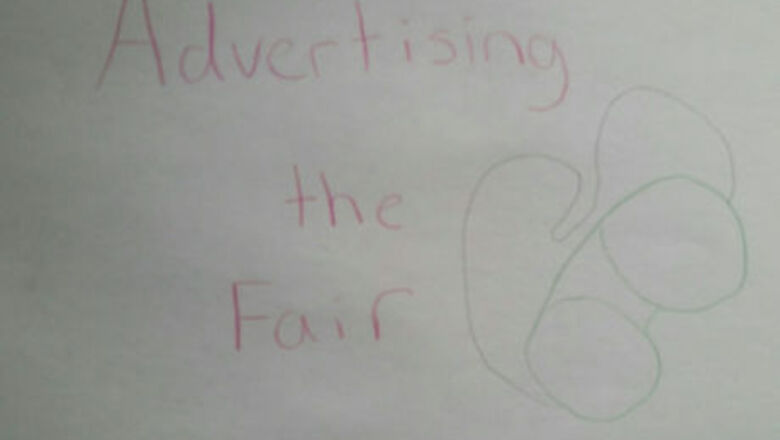
views
Getting a Plan Approved
Create an outline of your ideas for how the science fair should run. Be sure to include the following in your plan:[Image:Gettingplan.jpg|center] the approximate date and time, how you intend to advertise it, what decorations will be up, what refreshments will be there, what categories there will be, if any, whether or not it will be competitive, and if there are any prizes involved.
Add detail to your outline, making your bullets into paragraphs. This will be the proposal you hand in to get permission for the fair, so you need to switch the intended audience from yourself to you school administration. Check for spelling or grammar mistakes, and then reread it to see if you need to add detail anywhere. You may want to add a cover page as well.
Go to your guidance counselor to find out whose permission you would need to run a science fair at your particular school. (Most schools require any extracurricular activities to be run through administration first.) You may also want to check with whoever manages the area you want the science fair to take place in. (For example, check with the librarian if you want it to take place in the library.) Be sure to have the following things with you: an outline of the details of how you want it to be run, an approximate date, and where you want it to take place.
Change some aspects of your plan if you need to do so. Just change what they ask you to and persist in trying to get approval. You may also want to add extra detail this time so that they won't send it back to you asking for even more revisions. Resubmit your proposal with the revisions, and they should allow you to go forward.
Ask the science teachers if they want to attend the fair, or if they will endorse it by giving extra credit to those who participate. This is a definite motivator for students, so consider this as a route to go. This may also help in advertising as the science teachers may be excited about it and bring it up during their classes.
Advertising the Fair
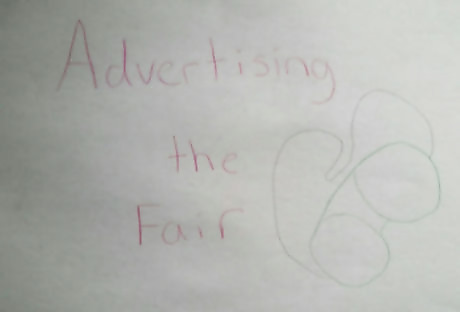
Create posters about it. Show the date and time of the fair. Be sure to also include how to contact you for any additional information. You may also want to include illustrations or images off of the internet formatted to make to poster interesting looking and attractive. Remember: you want people to be exposed to the idea in this stage. Be very clear in your poster about whether participants must work individually or if they are allowed to work in groups. Though the posters are good for advertising, don't have people sign up on the poster. You may want the participants to sign up by email or through you with their idea for their project so that you know more realistically how many people will be involved. This will tell you how much space they will need in total, as well as give you an idea of how to set up tables and chairs before the fair.
Ensure that you venue has enough space for all of the people signing up, or you may need to get permission to change venue. For example, a medium sized school library can fit roughly 30 people in an empty space and still be organized. Be sure to account for both the number of participants and the number of people coming just to watch. Normally, a few teacher and a few administrators will show up to the fair. Some parents and people from the local media might shows up as well, so be prepared for that too. If your fair has about 30 participants, be prepared to have about 10 extra people coming to watch.
Ask science teachers for permission to go into their science classes to talk about the fair. Give a five minute rundown of your ideas for the fair and how it will run, and then tell them how to contact you and how to sign up for the fair. Do not go by a show of hands to estimate how many people will attend, though, as many of the people who raise their hands might not end up attending the fair. Use the sign up method for estimating the number of participants.
Talk to your peers about it. This one is the easiest and most obvious step, but some people get so worked up in making this a matter of work that they forget to let their friends know about it. Let people know during lunch, at sports practice, or any free time about the science fair you are hosting. Ask them to spread the word about the fair to their friends as well. If you feel awkward bringing it up in conversation, send out texts to your friends about it and they will respond to the idea that way. This also takes away social pressures so they will be more likely to answer honestly about whether they can make it or not. Be sure to give them ample time to check their calendars before having them get back to you. If they can't make it, let them know that that is fine and to spread the word to others who might be able to.
Recruit judges through your advertising. For example, if you want to have a competitive science fair rather than just an exhibition-based one, you should ask the science teachers whose classes you advertise to if they want to be judges. If they can't, don't worry too much. There are normally other teachers or administration who are willing to do the task. You will likely need at least one judge per category of your fair, and at least 2 or 3 judges total. For example, if you have a "Research" category and an "Experimentation" category, make sure you have at least one each so that you don't overload one judge. Things to keep in mind when choosing a judge: available on the date of the science fair scientifically literate enthusiastic, and preferably talkative (so they can clarify parts of people's presentations when judging them) fair and unbiased towards the students participating
Ensure that both the participants and judges know the basis for scoring if that is applicable to your fair. The participants should be given ample time with these criteria so that they can keep them in mind while creating their projects. If possible, put these criteria on the posters you make and/or include them in your presentation to each class so the potential participants know as early as possible.
Setting Up for the Fair
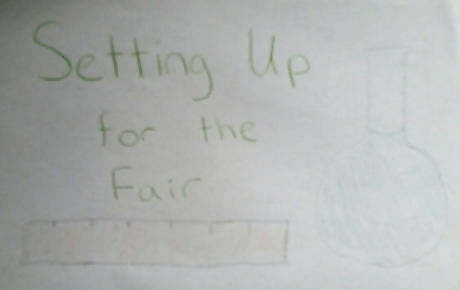
Make sure you have time to go to the store for refreshments a few days out. Buy enough snacks and drinks for however many people you expect to be there, and ensure that the food is fresh and of good quality. If you intend to bake something for the fair, make sure you have all of the ingredients you need and enough time to bake. Especially if you have a larger fair, you may want to have someone who can run to the store during the fair to pick up more snacks if they run out. If this is not possible, just be sure to bring more than you think you will need. After all, it's better to have leftovers than not enough food for everyone! Examples of things you would want to bring for roughly 30-35 people: 4-6 liters of soda (2-3 2 liter bottles) 60-70 cookies, cupcakes, or slices of cake, etc. 2-3 bags of chips
Bring ribbons, trophies, or other awards if you are awarding prizes for placing in the fair. Make sure you have enough to award them for every category that you created if this is applicable to your fair. You ma want to make each place a different colored ribbon (gold, silver, or bronze) or label the ribbons so that people will remember which place that they got.
Bring as many sheets for judging as there are presentations if your fair involves judging. The judges will fill these out during the presentations and give them back to you so you can determine the overall winner, or the winner in each category.
Ask for permission to leave class early to set up for the fair if it is after school. Let the administration know that you need time to set up. They should give you a pass to leave your class so that you can organize tables and chairs in a way that is optimal, as well as set out the refreshments. You will likely wants to leave at least 15 to 30 minutes before class gets out. Give yourself even more time if you plan on setting up decorations. You may also want to have a buddy who will help you set up if you have an elaborate setup or a large venue. Be sure that they have a note to get out of class as well.
Make sure that you have enough tables and chairs for the number or people you are expecting. If you realize that there are not enough, you may need to borrow some from classrooms which are not in use. Be sure to thank the teachers for allowing you to do so if you have get extras from their room.
Running the Fair
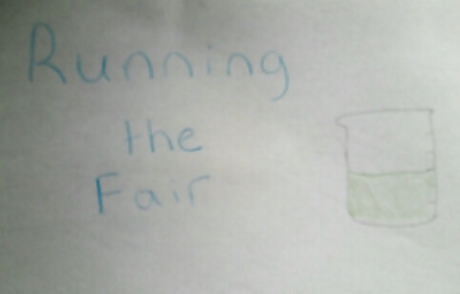
Sit back and watch people fill in with their projects. Aid them in setting them up if needed. Compliment their work and enjoy the fair. Ask them about the process of creating their projects and engage with them. Ask them if they are having a good time and thank them for coming. Be as grateful and polite as possible so that people will have a positive review of your fair and will be more likely to participate again next year if you decide to host another one.
Make sure that the judges get there with enough time to judge all of the projects. If you fair doesn't specify an end time, assume that it will run for about 2 to 3 hours. They will likely need about 3 to 5 minutes per presentation, so plan accordingly. Also make sure that you have enough time to sift through the judging papers and determine first, second, and third place overall and/or in each category. This should only take about ten minutes, unless you have more than 30 to 40 participants. If this is the case, give yourself 15 minutes to sift. You may want to give them another copy of the criteria in case they forgot their original copy.
Direct the judge to each presentation and allow to creator(s) of the presentation to give the judges a rundown of what their project is about and the specific components of it. Give the judges time to rate and ask questions before moving on the next set up. Awarded prizes, if applicable, about 10 minutes from the end of the fair.
Cleaning Up
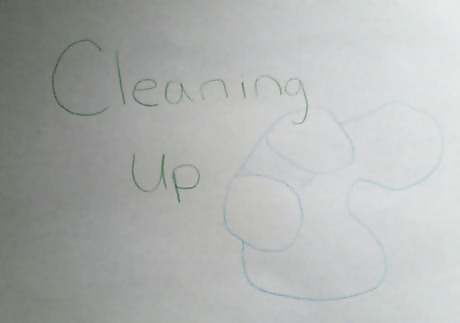
Help people take down their projects and talk about what you liked best from each of them. They should be appreciative that you hosted the fair and will likely thank you as well. Make sure that all projects get either sent home with the participants or sent to their teachers for extra credit or display.
Make sure all snacks get put away. Take any leftovers home with you and throw away any wrappers or crumbs on the floor. If anyone is helping you clean up, ask them if they think the job is done for a second set of eyes. Go by the standard of whoever in the group has the strictest idea of cleanliness so as to avoid leaving any trace of a mess that may upset the venue manager. When you think you're done, go back around and check under every table and chair to make sure you got everything. Wipe every table, especially if any spills took place.
Take down any decorations that are still up. Look around the room to make sure that you took down them all. If you plan on having the same fair next year, you may want to be careful while taking them down so that you can use the same decorations and not have to make new ones. Additionally, make sure you put all of the furniture back to their original positions as best as you can remember. Normally, a few people will stay after to help you out with taking down decorations and putting back furniture with this as a token of their appreciation for the fair. Be sure to thank them if they do.
Thank the venue manager for allowing you to use their place to host your fair. Ask if there was anything you could have done better, as well as about the things you did well in the fair itself as well as the clean-up afterwards. Ask them if you put the furniture back right and if you cleaned up to their liking. They will likely congratulate you on putting together the fair, so accept your congratulations with grace. Discuss with them any plans you may have to host the fair again next year.
















Comments
0 comment